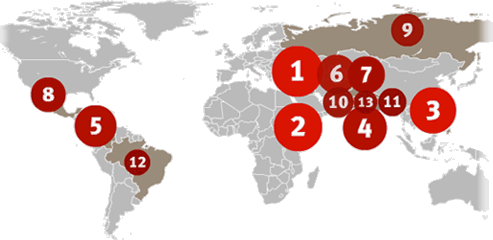Anti-media attacks and harassment flourished in a power vacuum left by the ruling coalition’s political struggles. Baburam Bhattarai of the Unified Communist Party of Nepal (Maoist) became prime minister in August, securing support with his proposal to offer amnesty for war crimes, including journalist murders. Four assailants were convicted in two separate journalist slayings, but masterminds remained unpunished as authorities struggled to address the nation’s entrenched culture of impunity. Of several assaults on journalists, at least one caused life-threatening injuries. Journalists received threats nationwide for their reporting, many from politicians or political youth groups. Assailants targeted at least six newspaper offices and burned hundreds of newspapers to limit distribution.
Nepal
» Political in-fighting fosters anti-press violence.
» Maoists seek amnesty for civil war crimes, codifying impunity.
Anti-media attacks and harassment flourished in a power vacuum left by the ruling coalition’s political struggles. Baburam Bhattarai of the Unified Communist Party of Nepal (Maoist) became prime minister in August, securing support with his proposal to offer amnesty for war crimes, including journalist murders. Four assailants were convicted in two separate journalist slayings, but masterminds remained unpunished as authorities struggled to address the nation’s entrenched culture of impunity. Of several assaults on journalists, at least one caused life-threatening injuries. Journalists received threats nationwide for their reporting, many from politicians or political youth groups. Assailants targeted at least six newspaper offices and burned hundreds of newspapers to limit distribution.
-
7th
Impunity Index ranking -
4
Prime ministers in 4 years -
4
Convictions -
4
Years missing -
3
Bones broken
With journalist murders going unsolved, Nepal is among the worst nations worldwide in combating impunity, CPJ's Impunity Index shows.

| 1. Iraq 2. Somalia 3. Philippines 4. Sri Lanka | 5. Colombia 6. Afghanistan 7. Nepal 8. Mexico | 9. Russia 10. Pakistan 11. Bangladesh 12. Brazil | 13. India |
The Constituent Assembly was tasked in 2008 with drafting a constitution and an electoral system for the new democratic republic. But the assembly has foundered, and successive leaders have failed to secure cross-coalition support.
3
Information and communications ministers in 2011.4
Extensions granted to the Constituent Assembly after it was supposed to finish its work in 2010.17
Rounds of parliamentary votes needed to elect Jhalanath Khanal of the Communist Party of Nepal (Unified Marxist Leninist) as prime minister in February. The subsequent election of Bhattarai came more easily, taking just one vote.Local courts sentenced four individuals to life imprisonment for the unrelated murders of Birendra Shah and Uma Singh. In both cases, though, masterminds evaded detention and trial.
A persistent record of impunity:
6: Journalists murdered since 2002.
4: Cases in which no convictions have been won.
2: Cases in which assailants have been convicted.
0: Cases in which masterminds have been convicted.
In 2007, armed men abducted Prakash Singh Thakuri, a Kanchanpur district freelancer, in retaliation for perceived pro-monarchy reporting. Many press advocates presume him to have been killed. Maoists in government blocked investigations of three youth cadres, according to the local press freedom group Freedom Forum.
A case on and off track:
2006: The Comprehensive Peace Agreement ended the civil war.
2007: Thakuri was abducted. His wife, Janaki, filed a report with Kanchanpur police.
2009: The Maoist-led government directed authorities to drop the case, saying the peace agreement precluded prosecution, according to Freedom Forum.
2011: Nepal's Supreme Court overturned the decision, and a Kanchanpur court reinstated the case.
Youth members of the Communist Party of Nepal (Unified Marxist Leninist) assaulted Nagarik journalist Khilanath Dhakal in June in reprisal for his coverage of political violence, news reports said. The assailants broke Dhakal's nose in multiple places. The newspaper itself faced retaliation for its reporting.
